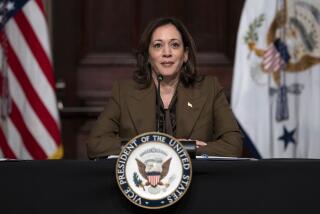Breaking the Ice : Diplomacy: At presidential library, George Shultz recalls historic Reagan- Gorbachev summit.
- Share via
SIMI VALLEY — The President’s men did not know what to do. The private meeting between Mikhail Gorbachev and Ronald Reagan was only supposed to last 15 minutes. But they had been locked together inside a small Geneva boathouse for more than twice that long.
When one Reagan aide asked then-Secretary of State George P. Shultz whether he should interrupt, Shultz replied: “If you’re stupid enough to go in and break up that meeting, then you don’t deserve the job you have.”
Thus began the end of the Cold War 10 years ago Nov. 19, as Reagan and Gorbachev began a warm relationship that spilled into negotiations over reducing the superpowers’ nuclear arsenals.
“It was a momentous day and a momentous meeting . . . with lots of opportunities for the two leaders to interact,” Shultz on Monday told an audience of about 350 at the Ronald Reagan Presidential Library.
With Nancy Reagan watching attentively from the front row, Shultz, other Reagan Administration officials and former aides to Gorbachev shared their memories at a conference celebrating the 10th anniversary of the historic Geneva summit.
Reagan was well-known as a hard-liner going into the talks, pushing a U.S. defense buildup, referring to the Soviet Union as the “Evil Empire” and proposing the missile-based Strategic Defense Initiative, known popularly as Star Wars.
Yet the President and his advisers thought the two superpowers could make progress at the Geneva summit if they could arrange a private meeting between the leaders so that Reagan could use his charm to warm personal relations.
Reagan and his team scouted the grounds and found a small boathouse on the lake--a perfect site for an intimate fireside chat with just Reagan, Gorbachev and their translators.
Nothing was left to chance in setting the stage for the “seemingly impromptu” meeting, Shultz said. “The word to the Secret Service was, ‘Keep the fire going, boys. Keep it lit.’ ”
The one-on-one meeting, free of negotiators and handlers, was scheduled for only 15 minutes. As it stretched on, Reagan’s aides were squirming outside, wondering whether to break it up--until Shultz stopped them from disrupting the course of history.
The tete-a-tete lasted about an hour and 15 minutes, Shultz said. “When they came out, they were both smiling.” Shultz knew that the plan had worked. “They clicked.”
Not only had they clicked, they had agreed on two additional summits, one in Washington and one in Moscow. The relationship that began that day led to arms-reduction talks that ended the Cold War.
Reagan, who has been stricken with Alzheimer’s disease, did not attend Monday’s conference. Nor did Gorbachev.
But a Gorbachev aide read a letter from the former Soviet leader, stating that the Geneva summit created mutual trust so they could move beyond rhetoric and talk to each other as human beings.
“He had the intuition,” Gorbachev wrote, “that allowed him to see me as someone who had not come to wage propaganda warfare, but wanted to do business, normalize U.S.-Soviet relations and begin ridding the world of the nuclear menace.”
The conference coincided with the public release of about 20,000 pages of White House documents on the Geneva summit, now kept in the library’s basement.
Two panel discussions included many of the key players in the Geneva negotiations, including Donald T. Regan, former White House chief of staff; Max M. Kampelman, former ambassador and head U.S. negotiator on nuclear weapons in Geneva; Fred Charles Ikle, former undersecretary of defense for policy; and Jack F. Matlock Jr., former U.S. ambassador to the Soviet Union.
Many of the participants had memoirs or other books for sale in the library’s bookstore. Several of them made a point of acknowledging Nancy Reagan’s role in the historic talks. At the time, she infuriated some Reagan Administration hard-liners by urging her husband to engage the Soviets in arms-control negotiations.
“We always thought she was the brains behind the foreign policy anyway,” quipped NBC correspondent Chris Wallace, who moderated a panel discussion.
In her memoirs, Nancy Reagan acknowledges she “encouraged Ronnie to meet with Gorbachev as soon as possible, especially when I realized that some people in the Administration did not favor any real talks.”
One former Administration official who had some of the more public clashes with Nancy Reagan--former Chief of Staff Regan--had a brief but icy encounter with the former First Lady during one of the breaks.
Smiling stiffly, the pair stood at arm’s length in the crowd and chatted briefly, former combatants marking a day of fond nostalgia for their place in history.
More to Read
Sign up for Essential California
The most important California stories and recommendations in your inbox every morning.
You may occasionally receive promotional content from the Los Angeles Times.













